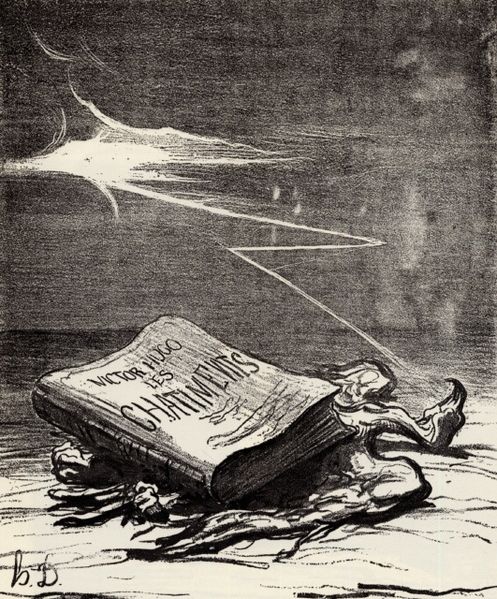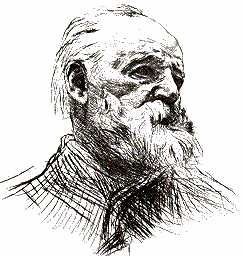Saw the thin-eyed fellow, he
Whom History named (that drôle—
Troplong too) Napoleon Three;—
At his window, leaning easy
Herds of servants in the van
One louche man of the Elysée,—
Another, savage desert man;
He, Sultan, born beneath the palm
Companion of the russet lion,
The untamed hajji, his eyes calm,
Pensive emir, fierce and kind,
Deadly, sombre personage
Spectre pale in white burnous
Who struck, in ecstasy of carnage,
Then dropped in shade upon his knees;
Who, flicking his tent flaps apart,
To pray beside the desert road,
Peaceful, lifting to the stars
Hands still stained with human blood;
Celebrating his swords’ blades,
He, mysterious dreamer, who
Sat on piles of human heads,
To contemplate the sky’s pure blue;
Seeing this traitor's look, deceit,
This low face of obscurest shame
He, pure soldier, pure priest,
Said: “and what is this one’s name?”
Before the vile moustachio-mask
He paused; but then he heard some geezer:
“Look out, emir, pass the axe!
This man—he is Bandit-Caesar!
“Hear the bitter plaints he utters
As his clamour just grows worse,
This man bears the curse of mothers
By all women he is cursed;
“Made them widows; forced their moans
He took France and cut her throat
Now he’s gnawing at her bones.”
So the hajji made salute.
But at bottom in his thoughts
He despised this blood-soaked Cain;
The tiger, with his nostrils taut,
Sniffed the wolf in sheer disdain.
Orientale
Lorsque Abd-el-Kader dans sa geôle
Vit entrer l'homme aux yeux étroits
Que l'histoire appelle—ce drôle, —
Et Troplong - Napoléon trois; -
Qu'il vit venir, de sa croisée,
Suivi du troupeau qui le sert,
L'homme louche de l'Elysée,
Lui, l'homme fauve du désert;
Lui, le sultan né sous les palmes,
Le compagnon des lions roux,
Le hadji farouche aux yeux calmes,
L'émir pensif, féroce et doux;
Lui, sombre et fatal personnage
Qui, spectre pâle au blanc burnous,
Bondissait, ivre de carnage,
Puis tombait dans l'ombre à genoux;
Qui, de sa tente ouvrant les toiles,
Et priant au bord du chemin,
Tranquille, montrait aux étoiles
Ses mains teintes de sang humain;
Qui donnait à boire aux épées,
Et qui, rêveur mystérieux,
Assis sur des têtes coupées,
Contemplait la beauté des cieux;
Voyant ce regard fourbe et traître,
Ce front bas, de honte obscurci,
Lui, le beau soldat, le beau prêtre,
Il dit : Quel est cet homme-ci ?
Devant ce vil masque à moustaches,
Il hésita ; mais on lui dit :
« Regarde, émir, passer les haches !
Cet homme, c'est César bandit.
» Ecoute ces plaintes amères
Et cette clameur qui grandit.
Cet homme est maudit par les mères,
Par les femmes il est maudit ;
» Il les fait veuves, Il les navre
Il prit la France et la tua,
Il ronge à présent son cadavre. »
Alors le hadji salua.
Mais au fond toutes ses pensées
Méprisaient le sanglant gredin
Le tigre aux narines froncées
Flairait ce loup avec dédain.
20 novembre. Jersey


No comments:
Post a Comment